May 27, 2025 | 08:05 GMT +7
May 27, 2025 | 08:05 GMT +7
Hotline: 0913.378.918
May 27, 2025 | 08:05 GMT +7
Hotline: 0913.378.918
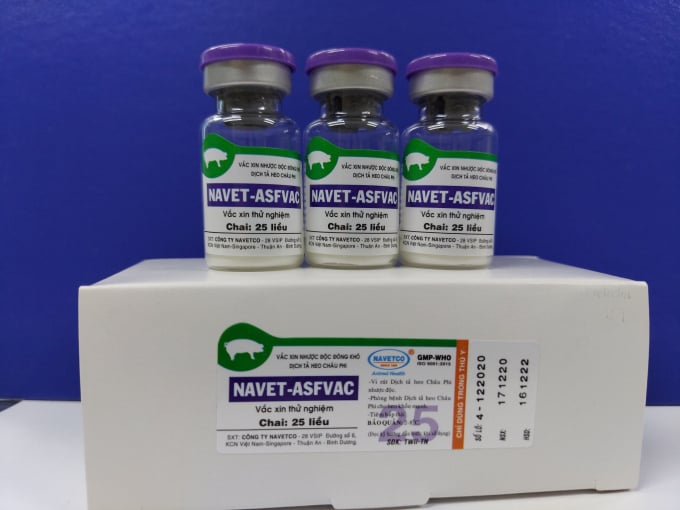
ASF vaccine product researched and produced by NAVETCO Company.
African swine fever (ASF) is a dangerous infectious disease caused by a virus of the Asfarviridae family. Depending on the virulence of the virus, the disease can manifest in acute, chronic, and latent forms. In the acute form, ASF can kill 100% of infected pigs.
The ASF virus does not cause disease in humans or other animals. This disease is mainly transmitted directly from infected pigs through insects or means of transport and tools used in the breeding process. There is currently no vaccine or specific treatment.
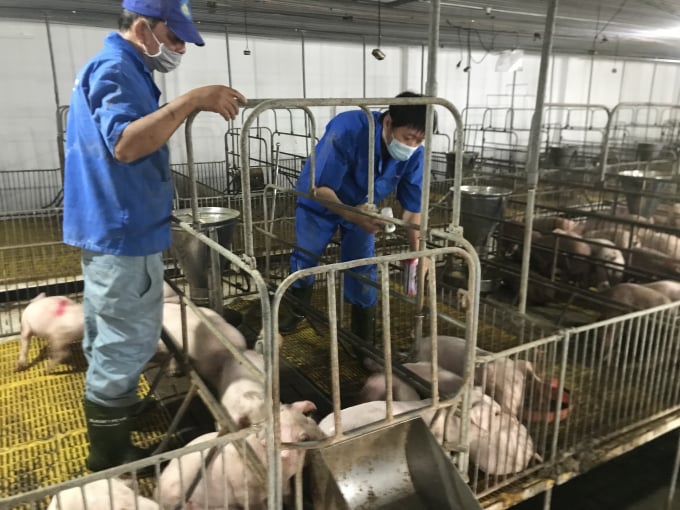
Test the ASF vaccine under manufacturing conditions.
ASF was first discovered in 1921 in Kenya. In 2007, the disease was detected in Georgia, then spread to the Russian Federation and some other European countries. In 2018, ASF was seen in China and many countries in Asia.
According to the Department of Animal Health report, ASF appeared in Vietnam in February 2019 in Thai Binh and Hung Yen provinces. The disease then spread rapidly over a large area. Unfortunately, up to now, ASF continues to occur at different levels nationwide, seriously affecting the development and stability of the pig herd in our country.
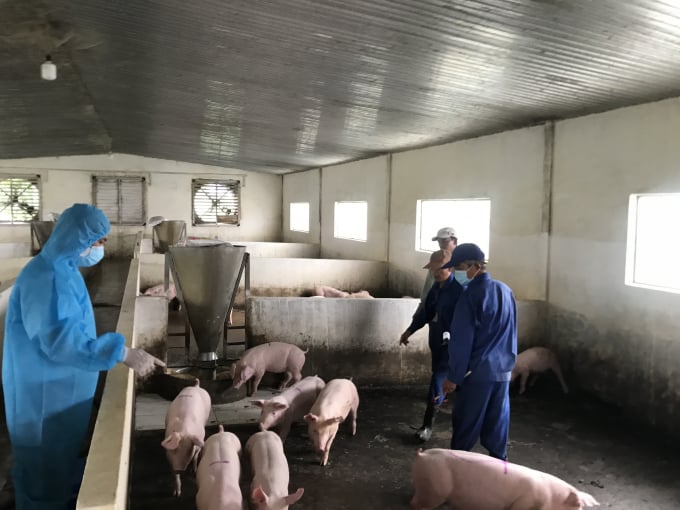
Scientists have approached the vaccine to remove the gene related to the virulence of the ASF virus.
For a long time, the level of danger of the disease to the pig industry was not paid enough attention. Only after ASF appeared in Georgia in 2007 and in some European countries, especially in 2018, when the disease occurred in China and spread rapidly to Asian countries, the study of disease prevention measures, including research Vaccine research, has attracted the attention of many nations.
There have been many vaccine approaches to treat ASF but have not been effective, such as inactivated vaccines or recombinant protein vaccines (subunits). Scientists have approached the vaccine to remove the gene related to the virulence of the ASF virus.
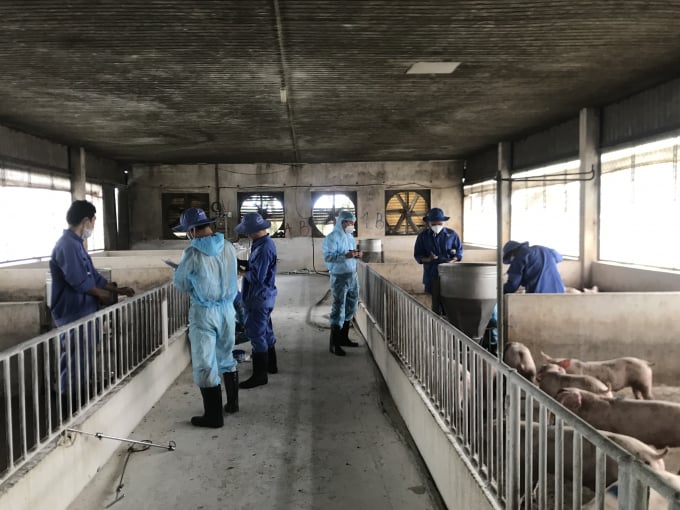
Two are fully qualified for use in vaccine production, inculding ASFV G-delta I 177L and ASFV G-delta I 177L/dLVR.
Dr. Borca and Dr. Douglas at the Plum Island Animal Research Institute (PIADC) in the United States have successfully created many attenuated strains of the ASF virus. Two are fully qualified for use in vaccine production, including ASFV G-delta I 177L and ASFV G-delta I 177L/dLVR.
Based on cooperation between the Ministry of Agriculture and Rural Development and the US Department of Agriculture and the agreement between NAVETCO and ARS (USA) on using the copyright of the two viruses mentioned above, Veterinary Medicine Joint Stock Company NAVETCO Central Medical Center ('NAVETCO') has researched the production of ASF vaccine in Vietnam. Currently, the Company is studying and producing two vaccines simultaneously using two attenuated ASF virus strains, in which ASFV G-delta I 177L strain is propagated and grown on PBMC acute fibroblasts; and ASFV strain G-delta I 177L/dLVR cultured on PIPEC cells (Plum Island Porcine Endothelial Cell).
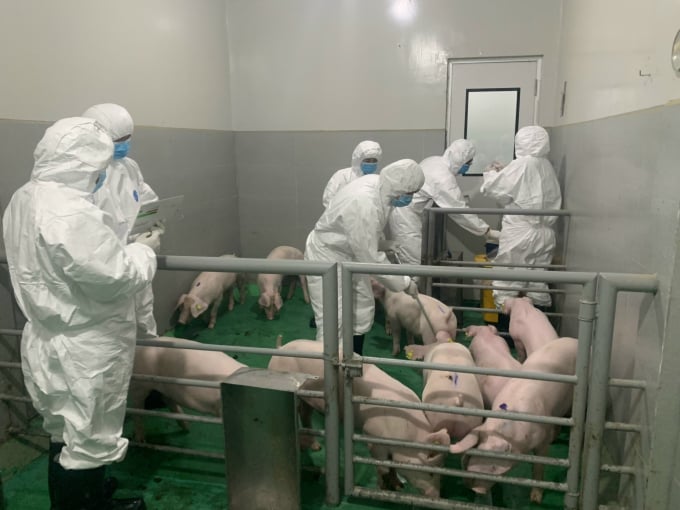
NAVETCO researches to produce ASF vaccine in Vietnam
After a period of implementation, the ASF vaccine research project at NAVETCO Company has obtained significant scientific and practical results that can be used to submit to the Department of Animal Health for a license to produce and circulate vaccines in Viet Nam.
The obtained results showed that ASF strain G-delta I 177L was safe in pigs when used at a dose 104 times higher than the minimum immune dose for 100% protection of immunized pigs.
The ability of the vaccine strain to return to virulence was also tested with the results of 5 consecutive subcultures in pigs that did not show signs of ASF in all cultures, especially in generation 5. It demonstrates the stability of G-delta virus strain I 177 L.
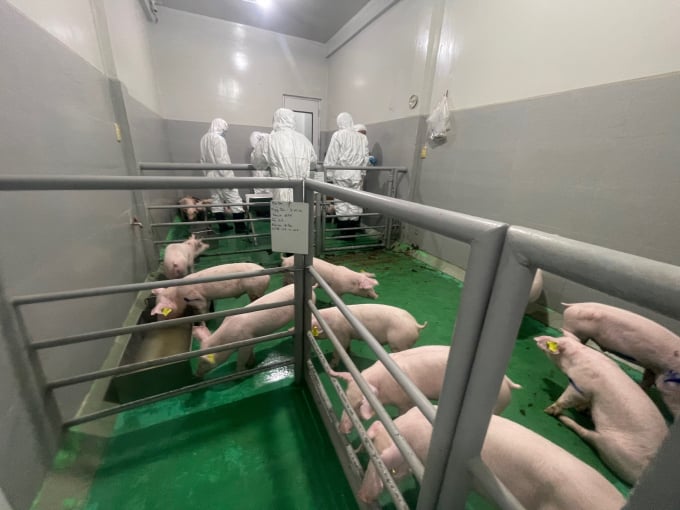
Transmissibility under vaccine production conditions was also tested in Yorkshire & Landrace crossbred pigs.
By evaluating six vaccine batches of experimental production, all six batches of vaccine met the requirements, with 100% of vaccinated pigs being protected and 100% of control pigs dying from virulent ASF virus.
The results of laboratory studies and vaccine vaccination trials in the field were carried out in several pig farms in the South, with more than 1500 pigs of all ages and breeds.
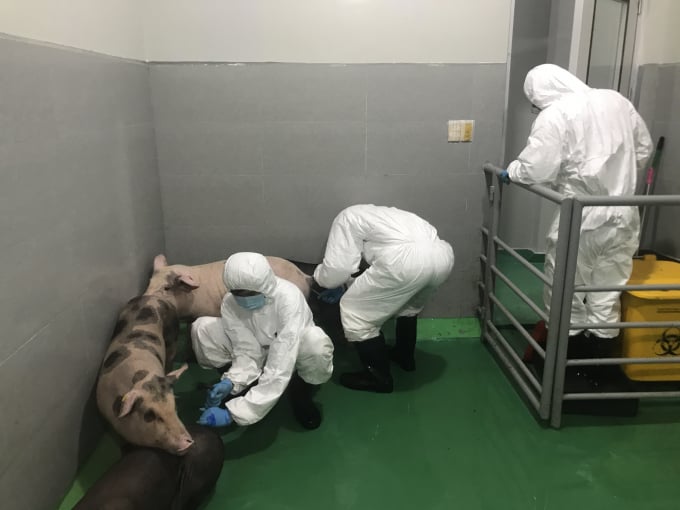
Vaccinated pigs are safe, have an antibody response of over 90%, and the vaccinated herd is safeguarded against the ASF virus.
The experimental pigs raised in different farms had different epidemiological characteristics associated with ASF, such as epidemic-free, very high-risk, or farms with a history of ASF.
Experiments have been recorded with good results, proving that the vaccine effectively protects the pig herd. Vaccinated pigs are safe, have an antibody response of over 90%, and the vaccinated herd is safeguarded against the ASF virus, even in threatened farms with a very high risk of outbreaks.
Transmissibility under vaccine production conditions was also tested in Yorkshire & Landrace crossbred pigs. The vaccine's effectiveness administered to pigs in the field, assessed by the virulence force, achieved a protection rate of 80–100%.
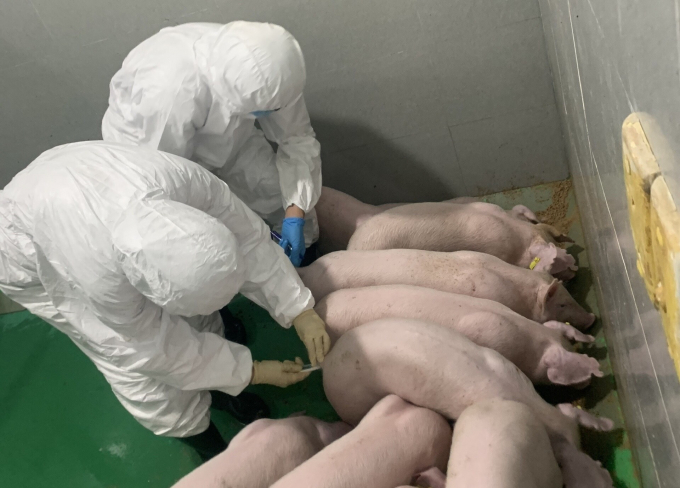
NAVETCO's research team has successfully researched the identification method to distinguish vaccine virus strains from virulent ASF virus strains.
Results from the field provide further evidence to demonstrate the safety and immunogenicity of the ASF vaccine strain used for production and the antigenic match between the vaccine strain and the ASF virus circulating in our country.
The search for tools for post-vaccination assessment and monitoring that are simple, easy to implement, and can assess the immune status of pigs is also researched, in which serological methods are used some different commercial ELISA kits that have been studied compared and can be applied to actual production.
To facilitate surveillance, NAVETCO's research team has successfully researched an identification method to distinguish vaccine virus strains from virulent ASF virus strains. It is currently continuing to study using hematological methods. Serological tests indicate between vaccination-induced immunity and acquired immunity from natural infection.
For PIPEC cell-adapted ASF virus, strain ASFV-G-delta I 177L/dLVR, research results show that like ASFV-G-delta I 177L strain, cell-adapted virus strain has active safe and able to stimulate a good immune response in pigs. Currently, vaccines have been successfully produced using PIPEC cell-adapted virus strains, and testing shows that all vaccine batches meet the requirements for sterility, safety, and efficacy.
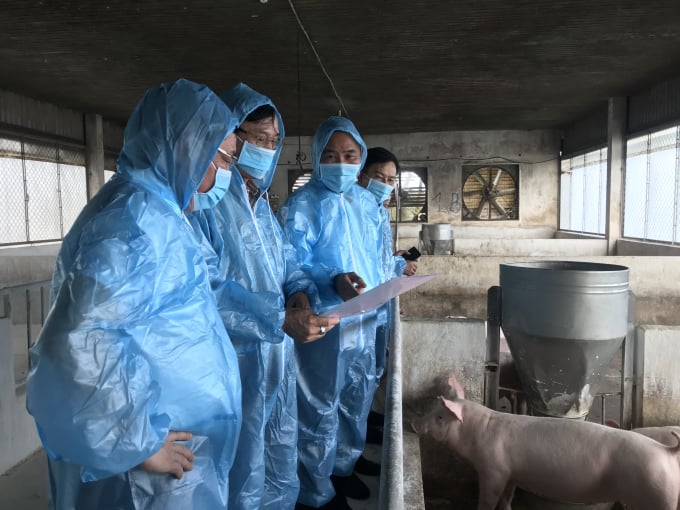
Leaders of the Ministry of Agriculture and Rural Development and the Department of Animal Health inspect the pig farm after ASF vaccination.
To ensure the scientificity and objectivity of the project's results, after the vaccine was evaluated by the Central Veterinary Drug Testing Center 1, the Department of Animal Health proposed that the Ministry of Agriculture and Rural Development establish a Scientific Council to assess the vaccine. Feasibility assessment of the research and production of vaccines at NAVETCO using strain G-delta I 177 L.
Based on the company's research results, the Department of Animal Health has officially accepted the license to conduct testing of ASF vaccines researched and produced by NAVETCO as the basis for the circulation of this vaccine in Vietnam.
The vaccine will be tested at two locations. The trial work has ended at a pig farm in the North with good results, while the second site continues to be monitored and is expected to end in December 2021.
With a current scientific team, a long experience in research and production of veterinary vaccines, and specialized equipment of standards, NAVETCO Company is confident of fulfilling the tasks assigned by the leaders of the Ministry of Agriculture and Rural Development. The Department of Animal Health leaders were assigned to produce and supply the ASF vaccine to ensure the ASF vaccine's quantity and quality.
Translated by Ha Phuc
/2025/05/25/4127-3-073637_820.jpg)
(VAN) Thanks to the promotion from an FAO-implemented project, vegetable production in greenhouses in Moc Chau has seen strong development, from 1.5 hectares in 2021 to nearly 50 hectares in 2024.

(VAN) FAO has recently supported USD 140,000 to implement the project 'Risk mitigation human-animal interface risks through disease control initiatives in pig farming.'

(VAN) The People's Committee of Tra Vinh province has approved an adjustment to the investment policy for the Green Hydrogen Plant project, increasing its area to approximately 52.76 hectares.
![Reducing emissions from rice fields: [2] Farmers’ commitment to the soil](https://t.ex-cdn.com/nongnghiepmoitruong.vn/608w/files/news/2025/05/05/dsc08881jpg-nongnghiep-140632.jpg)
(VAN) Clean rice cultivation model in Thuong Tan commune, Bac Tan Uyen district, is assisting local residents in achieving sustainable agriculture by substantially reducing costs, increasing productivity, and protecting the environment.

(VAN) At the conference to disseminate Resolution No. 68, AgriS introduced its digital agricultural ecosystem and reaffirmed its commitment to accompanying the Government in promoting private sector development and sustainable agriculture.

(VAN) 'Blue Ocean - Blue Foods' initiative is designed to restore marine ecosystems and establish sustainable livelihoods for local communities by cultivating a minimum of 1,000 hectares of cottonii seaweed in the first three years.
/2025/05/21/4642-3-112707_603.jpg)
(VAN) The V-SCOPE project has made direct contributions to three out of six pillars of the Comprehensive Strategic Partnership between Vietnam and Australia.